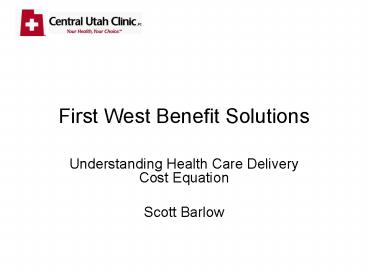First West Benefit Solutions - PowerPoint PPT Presentation
1 / 25
Title:
First West Benefit Solutions
Description:
Colorectal Surgery Radiation Oncology. Radiology Plastic Surgery. Otolaryngology Urology ... Wellness, Ambulatory Surgery Centers, Clinical Research ... – PowerPoint PPT presentation
Number of Views:24
Avg rating:3.0/5.0
Title: First West Benefit Solutions
1
First West Benefit Solutions
- Understanding Health Care Delivery Cost Equation
- Scott Barlow
2
Central Utah Clinic
3
- Largest Independent group in Utah with 94
physicians. Formed in 1969. - Cardiology Internal Medicine
- Orthopedics Hematology/Oncology Gastroenterology
Infectious Disease Nephrology Dermatology - Neurology Endocrinology
- Colorectal Surgery Radiation Oncology
- Radiology Plastic Surgery
- Otolaryngology Urology
- Critical Care Pulmonology
4
Central Utah Clinic
- Operate Fifteen physical locations in Provo,
Price and Salt Lake. - Provide outreach services to Ten satellite
offices to rural communities throughout Central
and Eastern Utah. - Services include, Imaging, Laboratory, Physical
Therapy, Radiation Oncology, Sleep Centers,
Cardiac Catheterization, Wellness, Ambulatory
Surgery Centers, Clinical Research and Pharmacy
services. - Central Utah Clinic has been recognized for its
leadership in implementing state-of-the-art
information technology including fully-functional
EHR and PACS systems.
5
(No Transcript)
6
Key Issues Facing Physicians
- Shrinking reimbursement/rising costs
- Liability insurance crisis
- Patient expectations
- Changing health insurance market
- E-healthcare revolution
- New tensions with hospitals
- Medical staff recruiting, leadership,
capacity, lead time and planning.
7
Shrinking Reimbursement/Costs
- Medicare SGR
Sources Medical Group Management Association
(MGMA), Centers for Medicare and Medicaid
Services (CMS), the American Medical Association
(AMA), and Medicare Payment Advisory Commission
(MedPAC). Estimates for 2005-2010 operating costs
and 2006-2010 MEI are 5-year average gains.
8
- Conversion Factor
- 1999 Medicare Conversion Factor 34.7315
- 2000 Medicare Conversion Factor 36.6137
- 2001 Medicare Conversion Factor 38.2581
- 2002 Medicare Conversion Factor 36.1992
- 2003 Medicare Conversion Factor 36.7856
- 2004 Medicare Conversion Factor 37.3374
- 2005 Medicare Conversion Factor 37.8975
- 2006 Medicare Conversion Factor 37.8975
- 2007 Medicare Conversion Factor 37.8975
- 2008 Proposed Medicare Conversion Factor
34.1350 - 2009 Proposed Medicare Conversion Factor
32.4283 - If Congress does not act, physicians will be paid
at a rate lower than 1999 while their cost have
increased by 42.5 since that time.
9
Shrinking Reimbursement/Costs
- Ranks of uninsured up to 47 million
- fueled by rising health insurance costs
- Shift to patient responsibility
- Emergence of pay for performance
- Lack of claim standardization edits, denials,
contracting clarity - Labor shortages.
10
Liability Reform
- Avg. premium increase from 2003-2004 was 37.2
- on top of an avg. 39.6 increase from
2002-2003 - One group had increase of 400
- Increasing rates of retirement, relocation,
limitations on high risk services - Source MGMA Web Survey of 770 groups, March,
2004
11
(No Transcript)
12
Patient/Public Expectations
- Transparency price, outcomes
- Coverage knowledge
- Access Retail clinics, one stop shop
- Services Boutique, Wellness Coach
- Information transfer
- Direct marketing brand name drugs
- Fountain of Youth
13
Changing Health Insurance Market
- Coverage for the uninsured
- Outcomes based payment P4P, PQRI, MCMP, ICD-10
- measurement?
- -- Payer consistency?
- Quality based reporting direction (Aetna,
United) - Cost shifting to employees
14
Changing Health Insurance Market
15
Clinical Data Exchange
- Paper Kills Transforming Health and Healthcare
with Information Technology - Newt Gingrich
- Physicians control 80 of spending decisions.
- 2004, 910 Million visits, average of 3 for each
American. - Majority of health care is in the ambulatory
setting.
16
E-healthcare Revolution
- Medical information not limited to a site.
- Patient access and privacy
- Cost of systems verses benefits
- Real time information exchange
- Meaningful quality data
- Shift in practice assets/ownership
- Priorities and willingness to share data
17
E-healthcare Revolution
- M
18
(No Transcript)
19
(No Transcript)
20
(No Transcript)
21
Tension with Hospitals
- New ventures pulling profitable service lines
away from hospitals - Specialty hospitals
- Ambulatory Surgical Centers
- Ancillary services imaging, PT, Cardio Caths
- Hospitals limiting / revoking privileges
- Hospitals limiting contracting options of plans.
- Joint ventures, IT activities create win / win
opportunities
22
Medical Staff
- Recruiting
- Utah difficulties
- Plan participation?
- Low unemployment
- Retention/aging medical staff
- Capacity
- Community needs, lead time.
- Field of Dreams
- Demographic changes
- Needs across the country
23
MD Workforce Changes
- Age Male Female
- Over 61 years old 88 12
- 42 to 60 years old 74 26
- 27 to 41 years old 58 42
- Under 26 years old 46 54
- Source AMA Membership Data, May 2006
24
- Never doubt that a small group of
- thoughtful, committed citizens can
- change the world. Indeed, it is the
- only thing that ever has.
- - Margaret Mead
25
- Scott Barlow
- CEO
- 801-429-8034
- sbarlow_at_centralutahclinic.com































